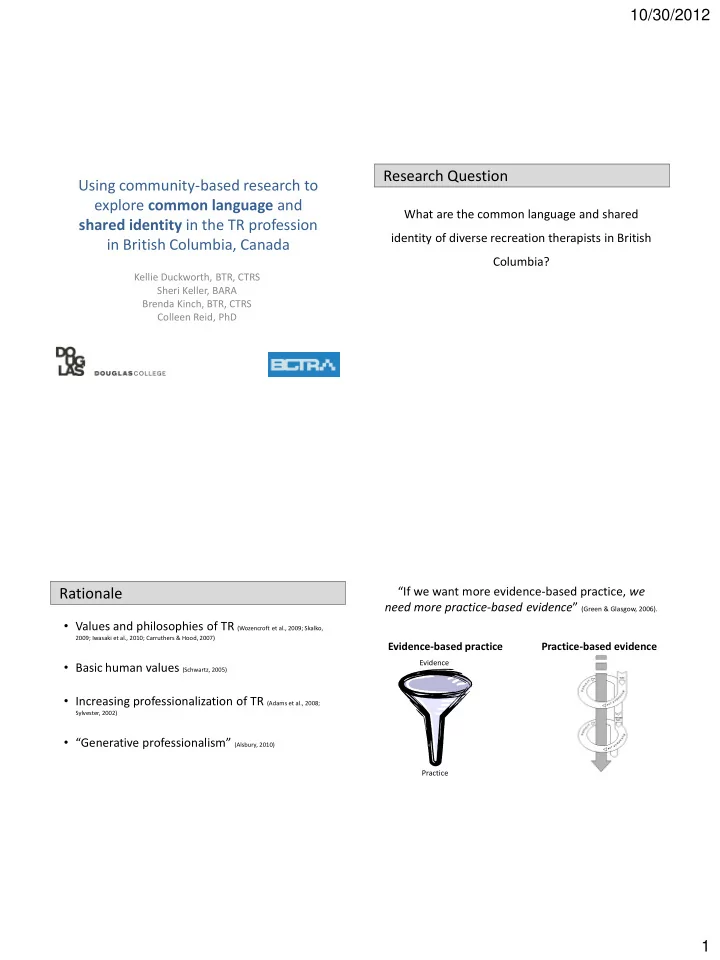

10/30/2012 Research Question Using community-based research to explore common language and What are the common language and shared shared identity in the TR profession identity of diverse recreation therapists in British in British Columbia, Canada Columbia? Kellie Duckworth, BTR, CTRS Sheri Keller, BARA Brenda Kinch, BTR, CTRS Colleen Reid, PhD Rationale “If we want more evidence -based practice, we need more practice-based evidence ” (Green & Glasgow, 2006). • Values and philosophies of TR (Wozencroft et al., 2009; Skalko, 2009; Iwasaki et al., 2010; Carruthers & Hood, 2007) Evidence-based practice Practice-based evidence • Basic human values (Schwartz, 2005) Evidence • Increasing professionalization of TR (Adams et al., 2008; Sylvester, 2002) • “Generative professionalism” (Alsbury, 2010) Practice 1
10/30/2012 Community-based Research (CBR) Research Methods • Ethics approval and informed consent ... is research undertaken in partnership with community • Data collection groups conducted with shared responsibility for • 84 fully completed surveys (surveymonkey.com) identifying research problems, developing methods • 4 pages long, open- and close-ended questions and applications, analyzing data and shared ownership • Data analysis of products .... [CBR has] an explicit goal of developing • Close-ended responses – frequency tables individual and group capacity, ultimately to affect • Open-ended responses – coded descriptively change (Community Based Research in Canadian Community Colleges and Institutions: A National Survey, 2008). Research Participants Research Participants • Purposeful & snowball sampling • Participants recruited through BCTRA list serve, CTRA 2011, word of mouth • Sample • 84 total • 68% lived in Metro Vancouver • 83% had more than 4 years work experience in TR • 46% held an undergraduate degree; 16% held a graduate degree 2
10/30/2012 Research Findings Therapeutic recreation in BC 1. Therapeutic recreation in BC 2. The language of TR 3. Recreation therapists’ identity and values There was a greater range of job titles with fewer years work experience and more consistency in job titles (with manager, supervisor) with more years experience Therapeutic recreation in BC The language of TR Majority of respondents with bachelor degree – fewer “In your own words, how do you describe TR to someone than 11 years experience who has never heard of it before?” Majority of participants with diplomas – greater than 14 Codebook: years experience 1. Population served 2. TR processes (assessment, implementation, evaluation, purposeful intervention, etc) 3. Purpose of TR (recreation as therapy or recreation as activity) 3
10/30/2012 The language of TR The language of TR Preferred Job Title Percentage Description 75% of respondents mentioned recreation and leisure as • More clinical “therapy” Recreation 60% therapist • Involved assessment • Required a degree “TR uses recreation as a treatment modality to help a • Hands-on Therapeutic 22% person improve aspects of his/her health” recreation • Did not involve practitioner assessment “Purposeful planned recreation interventions chosen • Required a diploma to bring about a specific health or wellness outcome” • CTRS certification Therapeutic 12% recreation • Newer and less 21% of respondents mentioned recreation as “activity” specialist familiar RT identity and values RT identity “What is it that you identify in yourself that makes you Theme Representative quotations an RT/TRP/TRS?” Knowledge “getting my degree in TR” (41) “using therapeutic programs to create change within the individual” “What values do you hold that help you in your work in “vast knowledge of benefits of leisure and recreation the field of TR? participation” Desire to “commitment to support and advocate for my clients” help others “be helpful… being supportive” (30) “love of people, compassion, and ability to engage” 4
10/30/2012 RT identity RT values TR Value Data fre- Key words from research participants Theme Representative quotations quency Passion for “passion for the field of RT” Self- 57 choice, autonomy, freedom, respect for diversity, individuality, uniqueness, intuition, human potential, leisure and “belief in the value of leisure” determination strengths-based, self-determination, hope, optimism the TR “[I am] someone who walks the talk in participating in Benevolence 53 relationships, empathy, kindness, care, compassion, profession all domains of leisure” helpfulness, attentiveness, love, understanding, support (30) 43 fairness, equality, inclusion, open-mindedness, Inclusion & empowerment, right to quality of life and leisure, advocacy rights Holistic, “seeing the person as a whole” person- “looks at big picture, identifies individual’s strengths 31 discipline, knowledge, skills, education, professionalism, Achievement & centred and ethics, quality, commitment, motivation, organization, and abilities” professionalism efficiency, leadership, assertiveness, critical thinking, strengths- “I maintain their [clients’] dignity by setting them up accountability based for success. I give choices with boundaries to enable Leisure & 20 humour, fun, leisure, recreation, benefits, balance, wellness approach positive results” pleasure (16) 19 honesty, integrity, trust Integrity Implications & recommendations Implications & recommendations 1. Bring consistency to the language of TR 1. Bringing consistency to the language of TR 2. Adopt community-based research approaches to … and clarity around its philosophical position can only help generate practice-based evidence advance how it is understood by others in the health professions as well as the general public. 3. Apply a strengths-based perspective to build the TR profession Our findings provide a portrait of a more unified than stratified profession • Solid base of values • Coherent sense of identity • Strong knowledge base • Professionalism 5
10/30/2012 Implications & recommendations Implications & recommendations 2. Adopt community-based research (CBR) approaches 3. Apply a strengths-based perspective to build the TR to generate practice-based evidence profession • Focus on our shared values • In research we need “to bring attention to the wholeness of • the individual in his/her life” (Iwasaki et al., 2010, p. 10). Acknowledge profession’s stage of development • Remain mindful of external factors that will influence how the • CBR brings together diverse partners and actively involves profession develops them in all phases of the research, making this an ideal research approach for honouring these deeply held TR values. Kellie Duckworth, BTR, CTRS kduckworth@cw.bc.ca Sheri Keller, BARA sheri.keller@fraserhealth.ca Brenda Kinch, BTR, CTRS thekinchs@hotmail.com Colleen Reid, PhD reidc@douglascollege.ca 6
Recommend
More recommend